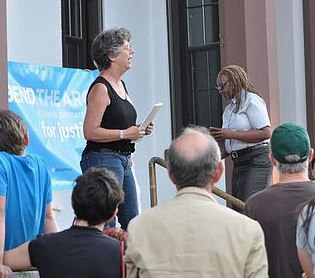Sex
LGBT Baby Boomer Sex: The Good, the Bad and the Loving
New research discusses getting it on and getting along as same sex couples age
Posted June 2, 2016
Their lives stretch from pre-Stonewall through the harshest years of the AIDS epidemic up to our current cultural moment of federal protection for same sex marriage and bathroom access for trans students in schools. Almost fifty years after the birth of the modern LGBTQ movement, what’s going on in the bedroom for these veterans of those tumultuous decades? Plenty, it turns out.
Researcher Jane Fleishman, PhD, recently investigated the sexual satisfaction of people 60-75 years old in same sex relationships. Just conducting this research was groundbreaking--there’s little known about sexual satisfaction in same sex relationships, and little research on sexual satisfaction among people sixty and older. The sexual satisfaction of seniors in same sex relationships? They’re defying myths even by having sex. But there’s more to the story.

Two hundred sixty five seniors in same sex relationships participated in Fleishman's online survey with 79 multiple choice questions looking at five variables: sexual satisfaction, relationship satisfaction, sexual communication, resilience, and internalized homophobia. Fleishman also included spaces where people could write responses in their own words. This non-random sample had equal numbers of men and women. Most respondents had been in their current relationships for over 20 years (with men more likely to be in longer-term relationships than women).
Among the main findings: for both men and women, sexual satisfaction was not only correlated with relationship satisfaction but relationship satisfaction was the only variable she tested that also predicted sexual satisfaction. Interestingly, sexual communication was not correlated with relationship or sexual satisfaction. The less internalized homophobia her participants experienced, the greater their relationship satisfaction. The implications? A same sex couple wanting to improve their sex life could concentrate on improving their relationship and reducing their internalized homophobia—but not their sexual communication. Or, the correlation could work in the other direction—a couple who wants to improve their relationship could work on reducing their internalized homophobia and improving their sexual satisfaction.
Sexual Behavior and Love
Respondents reported being satisfied (and dissatisfied) with a range of sexual behaviors. One wrote, simply, “Very happy and satisfied.” Another wrote, “Sex brings a closeness to our relationship. No matter how infrequent, it is still enjoyable. Been in a relationship 35+ years. Sex is warm and loving but rarely exciting.” Some described engaging in cuddling and massages that they now defined as sex, and found satisfying.
Some couples reported a diminished sex life, over the years. “My spouse and I have an almost non-existent sex life but we still love each other.” Other respondents reported being happy in a relationship with less sex, a situation which they found a relief after feeling strongly driven toward sex at a younger age. “Life is more comfortable as the sex drive lessens,” one participant wrote.
Health Challenges
Health took a toll on the sex lives of some respondents. One wrote, “We are a loving but non-sexual couple in a relationship of 20+ years….Sex was wonderful in the past; health issues changed everything.” One person described retaining feelings of intimacy, despite health problems that interfered with their sex life: “Sometimes a person wants to have sex but is unable to do so because of pain or treatment when fighting a disease such as cancer. If spirit is in their life, there is still a strong bond and a closeness that is as rich as a sexual experience.”
Identity Issues: "Utterly Happy"
Several respondents affirmed their joy in being lesbian, gay, bi or trans. One wrote, “I cannot imagine—nor would I want to—being anything other than gay. At my age (74), this wasn’t always so. Before I came out in my thirties, I resented my same-sex attractions. However, once I settled into my public persona as a gay man, I came to understand that I enjoyed my gayness. I was completely at home with being gay. And have never since then wished I were anything but gay….I am utterly happy to be a gay man.”
One trans respondent wrote about considering and rejecting gender reassignment surgery, saying they felt it would interfere with their "purpose in life." Another welcomed such surgery, writing, “I am a transwoman with a wonderful wife of 30 years. I am looking forward to gender confirming surgery and hope that after that I may retain some feeling in the genitals. Now, due to medication, erection is impossible. I often satisfy my wife in other ways. Our sex life could be more exciting and I hope it will become so.”
Monogamous (or Not!)
While most of the respondents reported being in a long-term “totally monogamous” relationship, this was not universal. One respondent described being, “polyamorous by nature and practice, with multiple long-term committed relationships including my partner of 24 years.” Fleishman found no correlation between being non-monogamous, monogamish, or monogamous, and sexual satisfaction.
Getting it On As We Age
This study reminds us that older adults in same sex relationships are still having sex into their 60’s and 70’s (and very possibly beyond). The results compel us to seek more research with this growing population. Many questions remain unexplored, since this sample did not tease out the intersections of race, religion, social class, and culture on sexuality, or the differences between younger and older respondents within this age group. The sample also had relatively few respondents who identified as trans or bi.
Several respondents thanked Dr. Fleishman for conducting the survey. One wrote, "We're here." And another, “It’s been a long time coming.”
To learn more, please contact Dr. Jane Fleishman at jane.fleishman@gmail.com. Fleishman is part of the Sexuality and Aging Consortium at Widener University and co-chair of an exciting conference on these topics in August 2016 at the Woodhull Sexual Freedom Summit in Washington, D.C.




